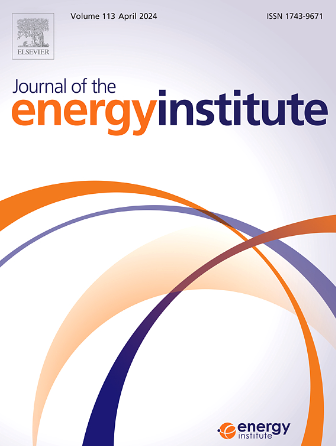使用木炭和木炭支撑铁催化剂催化生物质蒸汽气化制氢
IF 5.6
2区 工程技术
Q2 ENERGY & FUELS
引用次数: 0
摘要
由碳基燃料(如生物质和煤)热解产生的炭已被广泛用作支撑材料。在木屑气化过程中,制备了生物炭、煤焦、生物炭负载铁(Fe/B)和煤负载铁(Fe/C)用于焦油裂解和H2强化。所有实验都是在以蒸汽为气化剂的流化床气化系统中进行的。结果表明,各催化剂对焦油的去除效果依次为:生物炭;coalchar & lt;Fe / B & lt;Fe / C。在800℃和6 wt%的Fe/C催化剂下,H2含量最高,为49.2 vol%。当铁含量从0 wt%增加到6.0 wt%时,焦油裂解得到显著改善,但超过6.0 wt%后,改善效果不大。结果表明,添加蒸汽对木屑Fe/C催化剂气化气体中焦油含量的影响很小。然而,将气化炉温度从700°C提高到850°C导致焦油产量显著降低。这种减少是由于在气化过程中促进了裂化和重整反应。研究表明,焦炭组成对其还原焦油和增强H2的催化性能有显著影响。本文章由计算机程序翻译,如有差异,请以英文原文为准。
Hydrogen production from catalytic steam-gasification of biomass using char and char-supported iron catalysts
Char derived from the pyrolysis of carbon-based fuels, such as biomass and coal, has been widely used as a support material. In this study, biochar, coalchar, biochar-supported Fe (Fe/B) and coalchar-supported Fe (Fe/C) were prepared for tar cracking and H2 enhancement during wood chips gasification. All experiments were conducted in a fluidized bed gasification system using steam as the gasification agent. The results revealed that the effectiveness of each catalyst in removing tar is ranked as follows: biochar < coalchar < Fe/B < Fe/C. The highest H2 content (49.2 vol%) was also obtained at 800 °C and in the presence of 6 wt% Fe/C as catalyst. Tar cracking improved significantly with increasing Fe content from 0 to 6.0 wt%, but showed little further improvement beyond 6.0 wt% Fe content. The results indicated that adding steam had minimal effect on the tar content in the gas produced from the gasification of wood chips using the Fe/C catalyst. However, raising the gasifier temperature from 700 to 850 °C led to a significant reduction in tar yield. This reduction is attributed to the promotion of cracking and reforming reactions during the gasification process. This work showed that the char composition significantly influences its catalytic performance regarding tar reduction and H2 enhancement.
求助全文
通过发布文献求助,成功后即可免费获取论文全文。
去求助
来源期刊

Journal of The Energy Institute
工程技术-能源与燃料
CiteScore
10.60
自引率
5.30%
发文量
166
审稿时长
16 days
期刊介绍:
The Journal of the Energy Institute provides peer reviewed coverage of original high quality research on energy, engineering and technology.The coverage is broad and the main areas of interest include:
Combustion engineering and associated technologies; process heating; power generation; engines and propulsion; emissions and environmental pollution control; clean coal technologies; carbon abatement technologies
Emissions and environmental pollution control; safety and hazards;
Clean coal technologies; carbon abatement technologies, including carbon capture and storage, CCS;
Petroleum engineering and fuel quality, including storage and transport
Alternative energy sources; biomass utilisation and biomass conversion technologies; energy from waste, incineration and recycling
Energy conversion, energy recovery and energy efficiency; space heating, fuel cells, heat pumps and cooling systems
Energy storage
The journal''s coverage reflects changes in energy technology that result from the transition to more efficient energy production and end use together with reduced carbon emission.
 求助内容:
求助内容: 应助结果提醒方式:
应助结果提醒方式:


